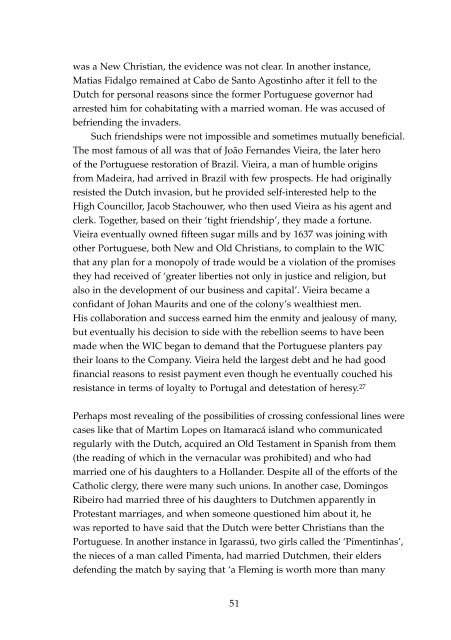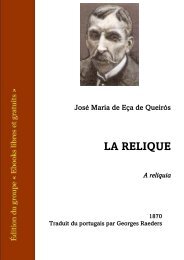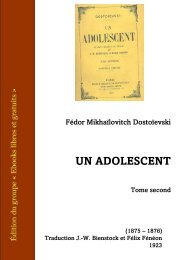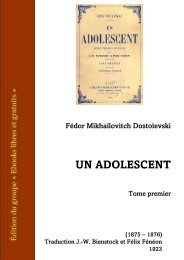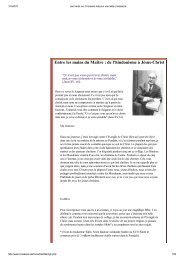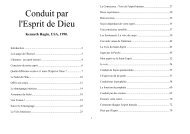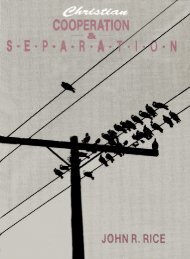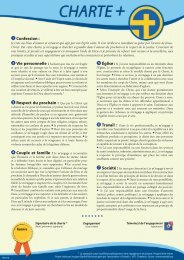The Expansion of tolerance
You also want an ePaper? Increase the reach of your titles
YUMPU automatically turns print PDFs into web optimized ePapers that Google loves.
was a New Christian, the evidence was not clear. In another instance,<br />
Matias Fidalgo remained at Cabo de Santo Agostinho after it fell to the<br />
Dutch for personal reasons since the former Portuguese governor had<br />
arrested him for cohabitating with a married woman. He was accused <strong>of</strong><br />
befriending the invaders.<br />
Such friendships were not impossible and sometimes mutually beneficial.<br />
<strong>The</strong> most famous <strong>of</strong> all was that <strong>of</strong> João Fernandes Vieira, the later hero<br />
<strong>of</strong> the Portuguese restoration <strong>of</strong> Brazil. Vieira, a man <strong>of</strong> humble origins<br />
from Madeira, had arrived in Brazil with few prospects. He had originally<br />
resisted the Dutch invasion, but he provided self-interested help to the<br />
High Councillor, Jacob Stachouwer, who then used Vieira as his agent and<br />
clerk. Together, based on their ‘tight friendship’, they made a fortune.<br />
Vieira eventually owned fifteen sugar mills and by 1637 was joining with<br />
other Portuguese, both New and Old Christians, to complain to the WIC<br />
that any plan for a monopoly <strong>of</strong> trade would be a violation <strong>of</strong> the promises<br />
they had received <strong>of</strong> ‘greater liberties not only in justice and religion, but<br />
also in the development <strong>of</strong> our business and capital’. Vieira became a<br />
confidant <strong>of</strong> Johan Maurits and one <strong>of</strong> the colony’s wealthiest men.<br />
His collaboration and success earned him the enmity and jealousy <strong>of</strong> many,<br />
but eventually his decision to side with the rebellion seems to have been<br />
made when the WIC began to demand that the Portuguese planters pay<br />
their loans to the Company. Vieira held the largest debt and he had good<br />
financial reasons to resist payment even though he eventually couched his<br />
resistance in terms <strong>of</strong> loyalty to Portugal and detestation <strong>of</strong> heresy. 27<br />
Perhaps most revealing <strong>of</strong> the possibilities <strong>of</strong> crossing confessional lines were<br />
cases like that <strong>of</strong> Martim Lopes on Itamaracá island who communicated<br />
regularly with the Dutch, acquired an Old Testament in Spanish from them<br />
(the reading <strong>of</strong> which in the vernacular was prohibited) and who had<br />
married one <strong>of</strong> his daughters to a Hollander. Despite all <strong>of</strong> the efforts <strong>of</strong> the<br />
Catholic clergy, there were many such unions. In another case, Domingos<br />
Ribeiro had married three <strong>of</strong> his daughters to Dutchmen apparently in<br />
Protestant marriages, and when someone questioned him about it, he<br />
was reported to have said that the Dutch were better Christians than the<br />
Portuguese. In another instance in Igarassú, two girls called the ‘Pimentinhas’,<br />
the nieces <strong>of</strong> a man called Pimenta, had married Dutchmen, their elders<br />
defending the match by saying that ‘a Fleming is worth more than many<br />
51


